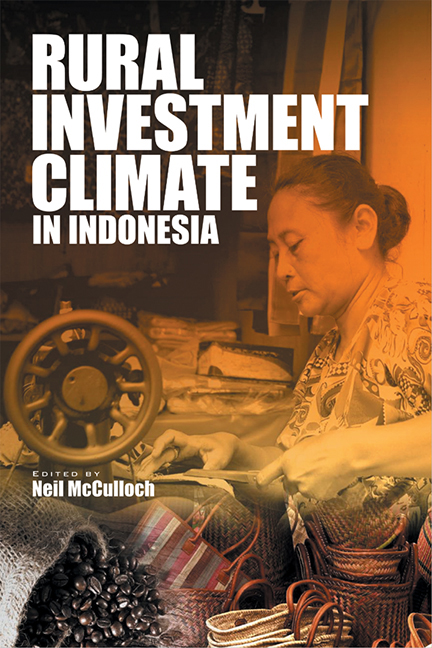Book contents
- Frontmatter
- Contents
- List of Tables, Figures, and Boxes
- Abbreviations and Acronyms
- The Contributors
- 1 Introduction
- 2 Agricultural Demand Linkages and Growth Multipliers in Rural Indonesia
- 3 Trends and Constraints Associated with Labour Faced by Non-Farm Enterprises
- 4 The Constraints in Accessing Credit Faced by Rural Non-Farm Enterprises
- 5 The Constraints Associated with Infrastructure Faced by Non-Farm Enterprises at the Kabupaten Level
- 6 Technology/Knowledge Transfer and Diffusion in Indonesian Non-Farm Enterprises
- 7 Marketing and Competition in the New Indonesia
- 8 Local Tax Effects on the Business Climate
- 9 Leadership and Voice in Local Governance
- 10 Insecurity and Business Development in Rural Indonesia
- Index
5 - The Constraints Associated with Infrastructure Faced by Non-Farm Enterprises at the Kabupaten Level
Published online by Cambridge University Press: 21 October 2015
- Frontmatter
- Contents
- List of Tables, Figures, and Boxes
- Abbreviations and Acronyms
- The Contributors
- 1 Introduction
- 2 Agricultural Demand Linkages and Growth Multipliers in Rural Indonesia
- 3 Trends and Constraints Associated with Labour Faced by Non-Farm Enterprises
- 4 The Constraints in Accessing Credit Faced by Rural Non-Farm Enterprises
- 5 The Constraints Associated with Infrastructure Faced by Non-Farm Enterprises at the Kabupaten Level
- 6 Technology/Knowledge Transfer and Diffusion in Indonesian Non-Farm Enterprises
- 7 Marketing and Competition in the New Indonesia
- 8 Local Tax Effects on the Business Climate
- 9 Leadership and Voice in Local Governance
- 10 Insecurity and Business Development in Rural Indonesia
- Index
Summary
Introduction
Infrastructural investment is fundamental to economic growth and to the development and structural change of low-income economies. Yet when considering the role that infrastructure can play and the size of investments by developing countries in infrastructure, there are surprisingly few studies of the way in which inadequate infrastructure can constrain enterprises and affect household living standards (Gibson and Rozelle 2003). In part, this lack of evidence reflects the difficulty of drawing causal inferences about the role of infrastructure from the available evidence. Therefore the methodological issues that arise when studying infrastructural constraints are discussed in the next section of this chapter.
Another constraint to understanding the role of infrastructure is a general lack of detailed information on the quality of infrastructure. Many surveys simply provide evidence on access to infrastructure but evidence is accumulating that the poor quality of rural infrastructure may be the more binding constraint on the activities of households and enterprises. Therefore the two main sections of this chapter report new evidence on the effect that infrastructure has on the importance of non-farm enterprises in rural Indonesia. This evidence comes from two surveys: the Indonesia Family Life Survey (IFLS) and the Rural Investment Climate Survey (RICS) carried out as part of the World Bank analysis of the rural investment climate in Indonesia. While most of the evidence comes from cross-sectional snapshots that are subject to certain interpretational difficulties, the two surveys are from different periods (2000 and 2005) so they can help to show whether infrastructural constraints are changing for the better or worse. Moreover, there is a limited analysis of the evidence about how changes in infrastructure can affect the importance of non-farm enterprises in the rural economy.
Although the chapter reports on a number of new analyses of Indonesian data, it does not suggest any new policy solutions for overcoming infrastructural constraints. However the results can at least guide the search for policy solutions because they show that the poor quality of infrastructure is a more major problem than a lack of infrastructure, especially for electricity and roads. Hence any policy solutions have to consider quality issues rather than just the more widely discussed access issues.
- Type
- Chapter
- Information
- Rural Investment Climate in Indonesia , pp. 110 - 139Publisher: ISEAS–Yusof Ishak InstitutePrint publication year: 2009



